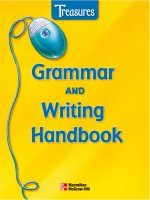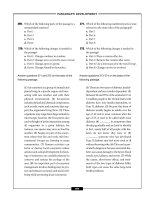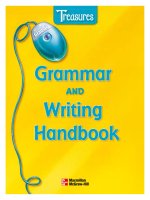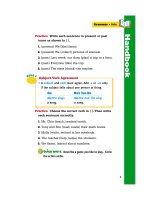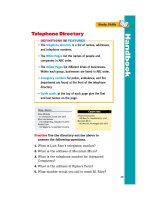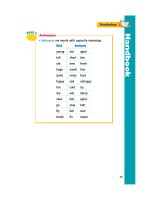treasures grammar and writing handbook grade 5 phần 6 pptx
Bạn đang xem bản rút gọn của tài liệu. Xem và tải ngay bản đầy đủ của tài liệu tại đây (437.9 KB, 28 trang )
Sentences
Practice Write each sentence. Draw one line under the simple
subject and two lines under the simple predicate.
1. Many paintings hang on the walls.
2. Picasso painted in a unique style.
3. My favorite painting is the one by Picasso.
4. The colors glow under the lights.
5. The museum offers painting lessons.
6. The next class begins tomorrow.
7. I like my art class.
8. The instructor teaches about the artists.
9. He shows us many colors.
10. New art classes start every month.
Write five sentences. In each sentence, draw one line
under the complete subject and two lines under the complete predicate. Then
write S above the simple subject and P above the simple predicate.
Q
UCK
WRITE
Q
UCK
WRITE
Practice Write each pair of sentences as one sentence with a
compound subject or a compound predicate.
1. Spiders were on display. Insects were on display.
2. The tarantula has eight legs. The tarantula has a hairy body.
3. Stewart observes the beetles. Stewart takes notes on
the beetles.
4. A boy notices the colorful butterfly. His mother notices the
colorful butterfly.
5. Do you want to stay? Do you want to go?
• A compound subject has two or more simple subjects that share
the same predicate and are joined by the word
and or or.
Stewart and Laura went to the museum.
• A compound predicate has two or more simple predicates that
share a subject and are joined by the word
and or or.
We
stopped and visited the insect exhibits.
Compound Subjects & Compound Predicates
141
Nouns
Practice Combine the nouns in each sentence by using and
or or to create one sentence. Underline each noun, and write
whether it names a person, place, thing, or idea.
1. Many girls performed dances. Many boys performed dances.
2. The stage in our school had lights. The stage had props.
• A noun is a word that names a person, place, thing, or idea.
The
festival was held on Monday.
Nouns
• A singular noun names one person, place, thing, or idea.
• A plural noun names more than one person, place, thing, or idea.
• Most plural nouns are formed by adding -s or -es.
Singular and Plural Nouns
• Sentences with related information about two different nouns may
be combined by using the
conjunction and or or to join the nouns.
Music will be presented. Dance will be presented.
Music and dance will be presented.
Combining Sentences: Nouns
Singular Plural Singular Plural
vegetable vegetables sandwich sandwiches
valley valleys pastry pastries
knife knives woman women
Practice Write each sentence. Draw one line under singular
nouns and two lines under plural nouns.
1. Sandwiches were sold at booths next to the sidewalk.
2. The woman tasted a dish made with noodles.
142
Nouns
Practice Write each sentence. Draw one line under each
common noun and two lines under each proper noun.
1. The women admired the costumes from India.
2. A Native American wore moccasins of leather and beads.
3. The fabrics from Africa have bold colors.
Write five sentences that each contain proper nouns and
common nouns. Underline all of the nouns. Above each noun write S for singular
nouns and P for plural nouns.
Q
UCK
WRITE
Q
UCK
WRITE
• A common noun names a person, place, thing, or idea.
• A proper noun names a particular person, place, thing, or idea
and begins with a capital letter.
Common and Proper Nouns
• A possessive noun is a noun that shows who or what owns or
has something.
Possessive Nouns
Description Examples
A singular possessive
adds ’s to a singular noun.
horse’s tail fox’s tracks
leaf’s color child’s toy
A plural possessive adds
’ to a noun that ends with
an s and ’s to plural nouns
that do not end with an s.
two horses’ tails many foxes’ tracks
many leaves’ colors two children’s toys
Practice Write each sentence. Use the correct possessive form
of the words in parentheses ( ).
1. I admired the (saddle of the Arabian horse).
2. The (daughter of the woman) clapped her hands.
3. The (tricks of the clowns) made everyone laugh.
4. The (floats of the parade) were very colorful.
5. The (weather of the day) was perfect for a parade.
143
Verbs
Practice Rewrite each sentence using the correct tense of the
verb in parentheses ( ).
1. Tomorrow we (watch) a play.
2. Yesterday the actors (perform) a comedy.
3. Now Rene (like) comedies better than mysteries.
4. Mrs. Thomas (want) to see a musical tonight.
5. Last year she (act) in a drama.
Practice Write each sentence. Underline and write AV above the
action verb. Underline and write
DO above the direct object.
1. My story told an adventure.
2. I needed some paper.
3. My sister borrows my pencils.
4. I bought a notebook.
5. I finished my story.
• An action verb is a word that tells the action of the subject.
I
wrote a story.
• A direct object is a noun or pronoun that tells to what or whom
the action is done.
She read the story.
Action Verbs and Direct Objects
• The tense of a verb tells when something happens.
Verb Tenses
Description Examples
A present-tense verb shows
something is happening now.
dances carries
A
past-tense verb shows something
has already happened.
danced carried
A
future-tense verb shows
something is going to happen.
will dance will carry
144
Verbs
Write five sentences that each contain an action verb.
Underline the verb. Then write if the verb is in the past, present, or future tense.
Q
UCK
WRITE
Q
UCK
WRITE
Practice Write each sentence. Use the past-tense form of the
verb in parentheses ( ).
1. My classmates and I (hope) everyone would like the show.
2. The girls (skip) to the music.
3. The audience (copy) our motions.
• The spellings of some verbs change when -es or -ed is added.
Spelling Present- and Past-Tense Verbs
Rules for verbs ending in: Examples
consonant + y
: change the y to i and
add -es or -ed.
Mavis tries to help Mom.
Mavis tried to help Mom.
one vowel and one consonant: double
the final consonant before adding -ed.
Rylie mopped the floor.
e: drop the e before adding -ed. Harrison baked a cake.
• A singular verb is used with a singular subject.
Sue wants to find a book.
• A plural verb is used with a plural subject.
The
customers want the new bestseller.
• Add -s to most verbs if the subject is singular and present tense.
• Do not add -s to the verb if the subject is plural or if the pronouns
are I or you.
Subject-Verb Agreement
Practice Rewrite each sentence using the correct form of the
verb in parentheses ( ).
1. The bookstore (sell, sells) hundreds of books.
2. My friends (want, wants) a book of poetry.
3. Pam and Bob (look, looks) for the comic books.
145
Verbs
Practice Complete each sentence with the linking verb in
parentheses ( ). Draw one line under the noun that renames
the subject. Draw two lines under the adjective that describes
the subject.
1. The student a champion. (be)
2. Her coach skillful. (be)
3. His parents supportive. (be)
4. James excited. (look)
5. The team ready to compete. (seem)
Practice: Write each sentence. Complete the sentence with a
helping verb.
1. I waiting for the race to begin soon.
2. The horses meeting at the starting line.
3. The winner finished in the fastest time.
• The main verb in a sentence shows what the subject does or is.
The horse is
leaping over the fence.
• A helping verb helps the main verb show an action or make
a statement.
The horse is leaping over the fence.
• Use a form of the verb be with the present participle.
• Use a form of the verb have with the past participle.
Main Verbs and Helping Verbs
• A linking verb links the subject of the sentence to a noun or an
adjective in the predicate. Linking verbs do not show action.
Patricia was a coach.
• Coach is a noun that renames the subject.
The gymnast
is strong.
• Strong is an adjective that describes the subject.
Linking Verbs
146
Verbs
Choose three irregular verbs. Write a sentence for each
using their present tense, past tense, and past participle forms.
Q
UCK
WRITE
Q
UCK
WRITE
Practice: Rewrite each sentence using the correct form of the
verb in parentheses ( ).
1. Last night we (choose) the path around the lake.
2. Several geese had (fly) above us.
3. We (go) slowly around the path that night.
4. I have (ride) my bike here before.
5. Dan (bring) bottles of water last night.
6. He had (give) a bottle to each of us.
7. Later Sarah (throw) a stone across the water.
8. Afterwards I (drink) the rest of my water.
9. That evening, we (see) the sun go down.
10. I have never (see) a more beautiful sight.
• An irregular verb is a verb that does not add -d or -ed to form the
past tense or the past participle.
• The helping verbs has, have, and had are used with the past
participles of irregular verbs to form other tenses.
Irregular Verbs
,
Description Examples
Present
Tense
Sarah runs to the park.
She buys new shoes.
Past Tense
Sarah
ran to the park.
She bought new shoes.
Past Participle
She
has run to the park before.
She already has bought new shoes.
147
Pronouns
• A pronoun is a word that takes the place of one or more nouns.
A pronoun must match the noun that it replaces.
Pronouns
• A subject pronoun can take the place of a noun that is the subject
of a sentence.
I, you, he, she, it, we, and they are subject pronouns.
Mario runs the meeting.
He runs the meeting.
• An object pronoun can be used as the object of an action verb
or after words such as to, for, with, in, or at. The words
me, you,
him, her, it, us, and them are object pronouns.
Mario tells
us how to protect the environment.
Subject Pronouns and Object Pronouns
Singular Pronouns I, you, he, she, it, me, him, her
Plural Pronouns we, you, they, us, them
Practice Write each sentence. Replace each underlined word or
words with a pronoun. Make sure that the pronoun matches the
noun to which it refers.
1. Maddie and Claire decide to attend the meeting.
2. The meeting is about recycling and conservation.
3. Mr. Alden gives the girls permission to attend the meeting.
Practice Write each sentence. Replace the underlined noun or
nouns with the correct subject or object pronoun. Underline
each subject pronoun.
1. Mario presents information about recycling.
2. Mario asks Claire and me to help set up a video.
3. The video shows how discarded plastic can harm wildlife.
4. Students ask Mario questions about recycling.
5. Mario tells the students how to conserve natural resources.
148
Pronouns
Write five sentences that include subject and object
pronouns. Make sure each subject pronoun agrees with its verb.
Q
UCK
WRITE
Q
UCK
WRITE
• Subject pronouns and verbs must agree. Singular subjects go
with singular verbs. Plural subjects go with plural verbs.
• Add -s to most verbs when you use he, she, or it. Do not add -s to a
present-tense verb when the subject is I, you, or a plural pronoun.
She asks questions. They ask questions.
• A compound subject can have two pronouns with the same
predicate. The verb agrees with the plural subject.
She and I ask questions.
Pronoun-Verb Agreement
Practice Rewrite each sentence with the correct present-tense
form of the verb in parentheses ( ).
1. He the principal about our meeting. (tell)
2. He and I the principal to start a recycling program.
(convince)
3. She that our school can help the environment. (know)
• A possessive pronoun shows who or what owns something.
Mario’s poster has information.
His poster has information.
• My, your, his, her, its, our, your, and their are possessive pronouns
that come before nouns. Mine, yours, his, hers, its, ours, yours,
and theirs are possessive pronouns that can stand alone.
I liked
your poster. That poster is ours.
Possessive Pronouns
Practice Write each sentence. Replace the underlined word or
words with the correct possessive pronoun.
1. The program succeeds due to the students’ hard work.
2. Mr. Alden is the program’s faculty advisor.
3. Mario’s poster convinces others to recycle.
149
Adjectives
Practice Write each sentence. Complete each sentence with an
article or another adjective.
1. Mount St. Helens is part of Cascade Range.
2. volcanoes are inactive and cause no harm.
3. Some volcanic eruptions have caused damage.
• Adjectives are words that describe nouns or pronouns. Adjectives
tell what kind or how many.
Mount St. Helens had a violent eruption in 1980. (what kind)
Before 1980, the volcano had few eruptions. (how many)
•
A, an, and the are special adjectives called articles. Use a or an to
refer to any one item in a group. Use the to refer to a specific item
or more than one item.
an eruption a volcano the lava
Adjectives and Articles
• A demonstrative adjective tells which one or which ones.
• This and these are demonstrative adjectives that refer to
something nearby.
According to these records, this volcano erupts often.
• That and those are demonstrative adjectives that refer to
something farther away.
Look in the distance at that volcano among those hills.
Demonstrative Adjectives
Practice Write each sentence. Complete each sentence with
this, that, these, or those.
1. Can I see brochures in your hand?
2. brochure has more information than this one.
3. facts about volcanoes are amazing!
150
Adjectives
Write five sentences about your classroom. Use adjectives
to describe and compare objects in the room. Include demonstrative, comparative,
and superlative adjectives.
Q
UCK
WRITE
Q
UCK
WRITE
• Use comparative adjectives to compare two nouns or pronouns.
taller than more active than better than
• Use superlative adjectives to compare more than two nouns
or pronouns.
tallest of all most active of all best of all
Comparative and Superlative Adjectives
Practice Write each sentence. Use the correct adjective from
the pair in parentheses ( ).
1. The volcano was (large, larger) than Kayla expected.
2. It was the (more amazing, most amazing) sight she had
ever seen.
3. It was the site of the (worse, worst) natural disaster in
100 years.
• Two sentences that tell about the same noun can be combined by
adding an adjective to one of the sentences.
There was hot lava. The lava was black.
There was
hot, black lava.
Combining Sentences with Adjectives
Practice Combine each pair of sentences by adding an adjective
to one of the sentences. Write the new sentence.
1. Kayla showed us pictures. There were several pictures.
2. She told about the volcano. The volcano was impressive.
3. It was a big volcano. The volcano was inactive.
151
Adverbs and Negatives
Practice Write each sentence. Draw one line under the adverb.
Write whether the underlined adverb tells how, when, or
where the action takes place.
1. One runner lifted her knees high to stretch her legs.
2. Another runner sat down and stretched.
3. Theresa walked around to keep her legs limber.
4. Sometimes Theresa hopped on one foot or the other.
5. Anna hummed quietly while she waited for the race to begin.
• An adverb tells more about a verb. An adverb tells how, when, or
where an action takes place.
Theresa jogs
slowly. (how)
The race begins soon. (when)
The fans gather nearby. (where)
•
Many adverbs end in -ly.
carefully sweetly happily softly
Adverbs
• Adverbs can describe adjectives as well as verbs.
Theresa felt
awfully nervous.
• Adverbs can also tell more about other adverbs.
Her heart was beating
very quickly.
Adverbs Before Adjectives and Adverbs
Practice Write each sentence. Write whether the underlined
adverb describes an adjective or another adverb.
1. Theresa was extremely nervous
about the race.
2. She was too excited to notice the cheering crowd.
3. She bolted very quickly at the sound of the whistle.
4. She ran quite well during the race.
5. Theresa was rather happy with her progress.
152
Adverbs and Negatives
Write six sentences with adverbs. Include a least one com-
parative adverb and one superlative adverb. Also include at least one negative.
Q
UCK
WRITE
Q
UCK
WRITE
Practice Write each sentence. Choose the correct comparative
or superlative adverb from the parentheses ( ).
1. Theresa ran (more quickly, most quickly) than the others.
2. Theresa had trained (harder, more hard) than her competitors.
3. Of all the fifth-graders, Theresa ran (more swiftly, most swiftly).
• Adverbs can compare two or more actions.
Comparing with Adverbs
To Compare Two Actions
Add -er to most short adverbs. longer, higher, slower
Use
more with an adverb that
has two or more syllables.
more quietly, more patiently
To Compare Three or More Actions
Add -est to most short adverbs. longest, highest, slowest
Use
most with an adverb that
has two or more syllables.
most quietly, most patiently
• A negative is a word that means “no.” Do not use a double
negative
in one sentence. Correct a double negative by changing
one negative into a positive word.
She didn’t want anyone to feel bad about the race.
Negatives
Practice Write each sentence correctly, using only one negative.
1. Before long, there wasn’t no one left on the track.
2. After the race, Theresa didn’t have no energy to celebrate.
3. Theresa didn’t want to do nothing but sleep.
153
Interjections and Prepositions
Practice Rewrite each sentence using correct capitalization
and punctuation.
1. Look there is film in my backpack
2. Hooray we will have pictures to remember our trip
3. Well should we start on our hike
4. Oh no the flash doesn’t seem to be working
5. Yikes we forgot to replace the batteries
• An interjection is a word or group of words that expresses
strong feeling.
Oops! We forgot to put film in the camera.
• A comma is used after a mild interjection.
Gee
, I guess we should have checked the camera.
• An exclamation mark is used after an interjection that expresses
very strong feeling.
Hey! Maybe there is film in our backpacks.
Interjections
• A preposition is a word that relates a noun or pronoun to another
word in a sentence.
My family enjoys traveling during the summer.
Prepositions
Common Prepositions
about among beside from off to
above around between in on under
across at by inside out until
after before down into outside up
against behind during near over with
along below for of through without
154
Interjections and Prepositions
Practice Write each sentence. Choose a preposition to complete
the sentence.
1. Our family enjoys spending time each other.
2. We drive the mountains.
3. We hike the trails.
4. The trails curve the river.
5. The view the mountains is beautiful.
Write five sentences with interjections and prepositional
phrases. Underline each prepositional phrase, and circle the object of
the preposition.
Q
UCK
WRITE
Q
UCK
WRITE
Practice Write each sentence. Draw one line under the
prepositional phrase. Draw two lines under the object of the
preposition.
1. My brother walked across the bridge.
2. He looked at the clear, blue water.
3. My parents brought a picnic for us.
4. After lunch, we spread out a blanket and relaxed.
5. Everyone rested under a large, shady tree.
• A prepositional phrase begins with a preposition and ends with
a noun or pronoun.
We love to explore
near the river.
• The object of a preposition is the noun or pronoun that follows
the preposition.
There is a bridge over the river.
• When the object of a preposition is a pronoun, use an object
pronoun
, such as me, you, him, her, it, us, or them.
You can see over
it to the other side.
Prepositional Phrases
155
Mechanics •
Abbreviations
• An abbreviation is a shortened form of a word. An initial is the
first letter of a name. Titles and initials begin with a capital letter
and end with a period.
Title Abbreviation Title Abbreviation
men Mr. Doctor Dr.
women Ms. Senator Sen.
married women Mrs. Governor Gov.
Name Initials
John Robert J. R.
Nancy Jane N. J.
Titles and Names
• In both formal and informal writing, use abbreviations for certain
organizations and government agencies. These abbreviations
usually have all capital letters and no periods.
United Nations UN Federal Bureau of Investigations FBI
Organizations
• Use abbreviations at the end of Internet addresses.
commercial .com educational .edu
organization .org network .net
Internet Addresses
Practice Rewrite each sentence. Change each word or group of
words in parentheses ( ) to an abbreviation or initials.
1. Our class contacted the (Department of Natural Resources).
2. We talked to a man named (Doctor) (Paul James) Donahue.
3. We asked about (woman) Keller, a famous botanist.
4. Our class was told to contact her at www.geese. (organization).
5. (woman) Keller works for the (Environmental Protection Agency).
156
Mechanics •
Abbreviations
• Use abbreviations to indicate time before noon and after noon.
These abbreviations are capitalized with periods after each letter.
Abbreviation Meaning
11:00 A.M. 11:00 ante meridiem (before noon)
11:00
P.M. 11:00 post meridiem (after noon)
Time
• In informal writing, use abbreviations of the days of the week
and the months of the year. These abbreviations begin with a
capital letter and end with a period.
Day Abbreviation Month Abbreviation
Monday Mon. January Jan.
Tuesday Tues. February Feb.
Wednesday Wed. March Mar.
Thursday Thurs. April Apr.
Friday Fri. May May
Saturday Sat. June June
Sunday Sun. July July
August Aug.
September Sept.
October Oct.
November Nov.
December Dec.
Days and Months
• Address abbreviations are capitalized and followed by a period.
Avenue Ave. Drive Dr.
Street St. Road Rd.
Boulevard Blvd. Post Office P.O.
Addresses
157
Mechanics •
Abbreviations
• United States Postal Service abbreviations for the names of
states consist of two capital letters. No period follows these
abbreviations.
State Abbreviation State Abbreviation
Alabama AL Montana MT
Alaska AK Nebraska NE
Arizona AZ Nevada NV
Arkansas AR New Hampshire NH
California CA New Jersey NJ
Colorado CO New Mexico NM
Connecticut CT New York NY
Delaware DE North Carolina NC
Florida FL North Dakota ND
Georgia GA Ohio OH
Hawaii HI Oklahoma OK
Idaho ID Oregon OR
Illinois IL Pennsylvania PA
Indiana IN Rhode Island RI
Iowa IA South Carolina SC
Kansas KS South Dakota SD
Kentucky KY Tennessee TN
Louisiana LA Texas TX
Maine ME Utah UT
Maryland MD Vermont VT
Massachusetts MA Virginia VA
Michigan MI Washington WA
Minnesota MN West Virginia WV
Mississippi MS Wisconsin WI
Missouri MO Wyoming WY
States
• Use abbreviations for units of measure. The abbreviation is the
same for singular and plural units.
in.—inch(es) lb.—pound(s) km—Kilometer(s) L—liter(s)
Units of Measure
158
Mechanics •
Capitalization
Practice Rewrite the friendly letter correctly. Use capital letters
where needed.
(1) dear friend,
(2) how are you? Let me just say, (3) “here is a poem for you.”
(4) roses are red.
Violets are blue.
Sugar is sweet.
And so are you.
(5) your friend,
Michael
• Capitalize the first word of a sentence.
My sister is going to camp.
• Capitalize the first word of a direct quotation. Do not capitalize
the second part of an interrupted quotation.
Dan cried, “Please stop the presses!”
“I am leaving,” Jan declared, “as soon as I can.”
• When the second part of a quotation is a new sentence, put a
period after the interrupting expression and capitalize the first
word of the new sentence.
“I
know that song,” said Lisa. “We learned it last week.”
• Capitalize all words in the greeting of a letter.
Dear Sirs: Dear Friend,
• Capitalize the first word in the closing of a letter.
Sincerely, Yours truly,
• Capitalize the first word of each line of poetry unless the word is
not capitalized in the original piece.
I shot an arrow into the air,
It fell to earth, I know not where;
For, so swiftly it flew, the sight
Could not follow it in its flight.
First Words
159
Mechanics •
Capitalization
• Capitalize the names of people and the initials that stand for
their names.
James Robert Perry J. R. Perry
• Capitalize titles or abbreviations of titles when they come before
or after the names of people.
Mr. James Perry, Jr. General J. P. Perry Dr. Ellen Mahoney
• Capitalize words that show family relationships when used as
titles or as substitutes for a person’s name.
Then Dad and Grandma Ellen cooked dinner.
• Do not capitalize words that show family relationships when they
are preceded by a possessive noun or pronoun.
Diane’s grandmother is a good cook. Her dad is a good cook, too.
• Capitalize the pronoun I.
Can I help cook dinner?
Proper Nouns: Names and Titles of People
Practice Rewrite each sentence correctly. Capitalize the names
and titles of people where needed.
1. p. j. and i made brownies for the family party.
2. My uncle, general steven ross, loved them.
3. My uncle and i ate five brownies each.
4. Father helped grandpa make pasta.
5. Grandpa said that mr. matthews gave him the recipe.
160
Mechanics •
Capitalization
Practice Rewrite each sentence correctly. Use capital letters
where needed.
1. Our class drove through titusville, florida, to visit the john f.
kennedy space center.
2. The bus drove south along cheney highway.
3. We looked at the atlantic ocean, and then we went inside to
learn about space.
4. We learned about the crab nebula, an exploding star far
from earth.
5. We also learned about mars, the fourth planet from the sun.
• Capitalize the names of cities, states, countries, and continents.
Do not capitalize articles or prepositions that are part of the name.
City Austin
State Texas
Country United States of America
Continent North America
• Capitalize the names of bodies of water and geographical features.
Atlantic Ocean Niagara Falls
• Capitalize the names of sections of the country.
the South the Pacific Northwest
• Do not capitalize compass points when they just show direction.
New York is east of Cleveland.
• Capitalize the names of streets and highways.
Elm Street Santa Ana Freeway
• Capitalize the names of buildings, bridges, and monuments.
Sears Tower Brooklyn Bridge Jefferson Memorial
• Capitalize the names of stars and planets.
The closest star to our planet is Proxima Centauri.
The planet closest to the sun is Mercury.
• Capitalize Earth when it refers to the planet. Do not capitalize
earth when preceded by the. Do not capitalize sun or moon.
One moon revolves around Earth.
The earth revolves around the sun.
Proper Nouns: Names of Places
161
Mechanics •
Capitalization
• Capitalize the names of schools, clubs, businesses, and
political parties.
Albright Middle School Explorers’ Club
Reynold’s Pharmacy Democratic Party
• Capitalize the names of historic events, periods of time, and
documents.
Battle of Bunker Hill Colonial Period
Declaration of Independence
• Capitalize the days of the week, months of the year, and holidays.
Do not capitalize the names of the seasons.
We started school on Tuesday, September 1.
Our first vacation is on Labor Day.
My favorite season is autumn.
• Capitalize abbreviations.
Dr. Ave. Sept. Ln.
• Capitalize the names of ethnic groups, nationalities, and languages.
The French won the war. I speak Japanese.
• Capitalize proper adjectives that are formed from the names of
ethnic groups and nationalities.
Italian bread Egyptian cotton
• Capitalize the first word of each main topic and subtopic in an
outline.
I. Products and exports
A. Natural resources
B. Manufactured goods
Other Proper Nouns and Adjectives
Practice Rewrite each sentence correctly. Use capital letters
where needed.
1. The fifth graders at jefferson elementary are studying the
louisiana purchase.
2. The jeffersonville historical society has helped them gather
information.
3. The Louisiana Territory had been changing hands since the
seven years’ war.
4. spanish, french, and british troops had all occupied the territory.
5. The students wondered if the troops spoke english.
162
Mechanics •
Capitalization
• Capitalize the first, last, and all important words in the title
of a book, play, short story, poem, film, article, newspaper,
magazine, TV series, chapter of a book, and song.
I can’t wait to read Roll of Thunder, Hear My Cry.
Did you see Peter Pan at the community theater?
A clever short story is “Rip van Winkle.”
My favorite poem when I was young was “Old King Cole.”
You should read “Cars of the Future” in this month’s
Vehicles Monthly.
My dad reads The Los Angeles Times every morning.
Did you watch Newsbreaker last night?
Chapter one of that book is titled “The Long Night.”
I sang “The Star-Spangled Banner” before the big game.
Titles of Works
Practice Rewrite each sentence correctly. Capitalize all titles
of works.
1. Our school newspaper, the titan times, prints entertainment
reviews.
2. One writer liked the book stuart little.
3. Her favorite chapter was titled “a narrow escape.”
4. Another writer reviewed a play titled the great divide.
5. He compared it to the short story titled “opposite ends.”
6. One writer reviewed the choir’s performance of “somewhere
over the rainbow.”
7. I remember that song from the film the wizard of oz.
8. Next month, I’ll write a review for the television series titled
karate man.
9. The article’s title will be “getting your kicks.”
10. Maybe I’ll write a review of my favorite magazine, kidsports, too.
163
Mechanics •
Punctuation
• Use end punctuation at the end of a sentence.
• A period ends a declarative sentence. A declarative sentence
makes a statement.
I have a cold.
• A period ends an imperative sentence. An imperative sentence
makes a command or a request.
Keep yourself warm.
• A question mark ends an interrogative sentence. An interrogative
sentence
asks a question.
Will I get well?
• An exclamation mark ends an exclamatory sentence. An
exclamatory sentence expresses strong emotion.
I finally feel better!
End Punctuation
• Use a period at the end of an abbreviation (in informal writing).
Dr. St. Tues. Jan.
• Use a period in abbreviations for time (in both formal and
informal writing).
12:00
A.M. 12:00 P.M.
• Use a period after initials.
P. J. Reynolds
• Use a period after numbers and letters in an outline.
I. Margaret Mead
A. Famous anthropologist
B. Summary of her work
Periods
Practice Write each sentence. Use correct punctuation.
1. Do you have any chicken soup
2. At 10:00 AM, some ladies brought chicken soup to my house.
3. I liked Mrs Nelson’s chicken soup best.
4. “AJ Jones,” she said, “you’ll feel better soon.”
5. How hot it was
164
Mechanics •
Punctuation
• Use a colon to separate the hour and the minute when you write
the time of day.
12:45 1:15 6:30
• Use a colon after the greeting of a business letter.
Dear Sirs: Dear Mr. Franklin:
Colons
• Use a hyphen or hyphens in certain compound words.
drive-in merry-go-round
• Use a hyphen to show the division of a word at the end of a line.
Always divide the word between syllables.
Jennifer wants to go camping and canoe-
ing this weekend.
• Use a hyphen in compound numbers.
twenty-two students forty-nine stairs
Hyphens
• Use an apostrophe and an s (’s) to form the possessive of a
singular noun.
Jason’s book my mom’s bike the car’s horn
• Use an apostrophe and an s (’s) to form the possessive of a
plural noun that does not end in s.
children’s books men’s shoes geese’s feathers
• Use an apostrophe alone to form the possessive of a plural noun
that ends in s.
ladies’ purses donkeys’ brays lilies’ scent
• Use an apostrophe in a contraction to show where a letter or
letters are missing.
we + are = we’re he + is = he’s would + not = wouldn’t
• Do not use an apostrophe in a possessive pronoun.
its good points their friends your idea
Apostrophes
165
